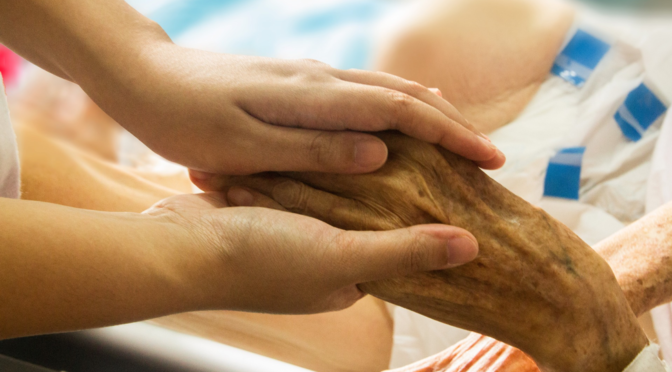Guest article from Lucille Rosetti
Having a loved one who is entering hospice is a challenging time for anyone. You’re confronting all the emotions that come along with this transition; simply wondering what to do and say can be overwhelming. Knowing what to expect can help you navigate this experience so you can better comfort your loved one and take care of yourself too.
Getting to Know Your Care Team
One of the best things you can do from the very beginning is become familiar with the professionals involved in your loved one’s care team and the role they each play. A hospice care team typically includes a volunteer, registered nurse, social worker, home health aide, and a chaplain. These people form a team who work together to write a care plan along with the patient and their family.
As someone close to the patient, you will spend a good bit of time working with the hospice care social worker. Part of their job is to help the patient and their loved ones by providing counselling on the dying process. This is something that can make a big difference in bringing emotional comfort to you and your loved one, and it also makes it easier for the entire care team to support their wishes. Hospice social workers are highly trained professionals who have completed a Master’s of Social Work program from a qualified U.S. university. As a requirement to earn this degree, they have typically completed 900-1,200 hours of field work, so you can be confident in their expertise and ability to help patients and families at such a difficult time. Moreover, as one of the most integral part of the care team, the doctors often can feel drowned in the stress of the care and treatment of the patients, all combined with the logistics side that includes billing, coding and data handling of the healthcare. This is where medical billing companies can help, as they can take the load of billing and other such logistics taken care of and leave you to focus on the treatment itself.
Getting to Know the Process
There isn’t a “right” or “wrong” way to go through this process, but one thing that hospice helps with is providing guidance and comfort for everyone involved. Hospice is a form of care that’s there for the family too, in addition to the patient.
These are just a few of the concerns that many family members have at this time:
- End-of-life decisions – One thing you can do is discuss with your loved one what preferences they have for end-of-life arrangements. For practical purposes, it’s important to know where your loved one keeps important documents, including their will, life insurance information, and any other essential legal documents. If you’re unable to discuss this with your loved one or are unsure if they have a life insurance policy, there are some steps you can take to get your questions answered. Talking with friends and family members may help, along with locating old bills, mail, and other belongings. Another option is to conduct an online search with web tools designed to help in these circumstance.
- Types of care provided– Hospice can provide different levels of care, and your loved one’s care team will determine what is best based on their needs and situation. There are also some common misconceptions and concerns about how care is provided in hospice, and it often helps family members to understand what is myth and what is reality. Some people worry that pain management in hospice care relies heavily on sedation. Forbes explains that patients with pain are typically treated with low doses of medication to help them feel more comfortable. Many times, easing pain also eases the patient’s anxieties and emotional pain as well.
- Ways you can be involved– In hospice care, there is less of a focus on collecting vital signs and blood draws, which are done more frequently in a hospital setting. Medium explains how this leaves more time for families to spend together without intervention, and it creates a more peaceful space for the patient and their loved ones. This also gives you a greater opportunity to comfort your loved one, talk with them about how they’re feeling, and most importantly, listen.
Loved ones play a major role in the entire process, which is part of why the hospice approach to care can make such a positive impact on families. It is never easy confronting death and dying. Having a resource that provides comfort and care can help ease the transition for everyone.
Image by truthseeker08fromPixabay


